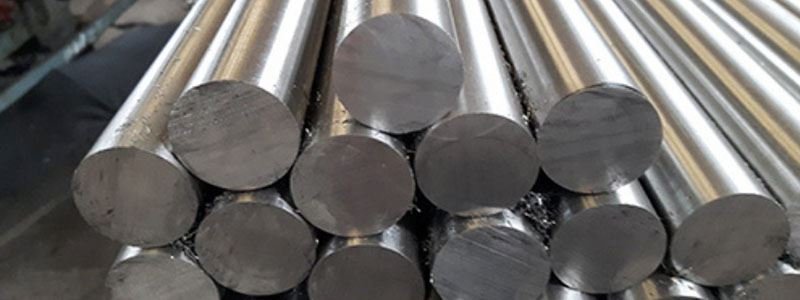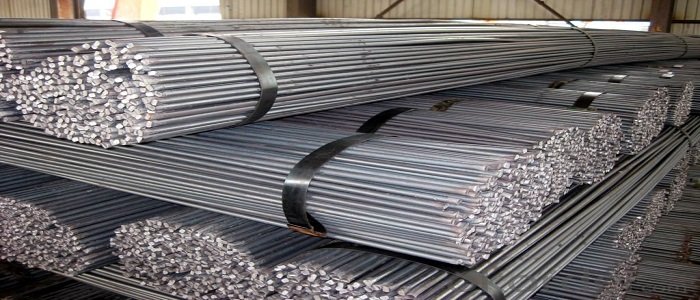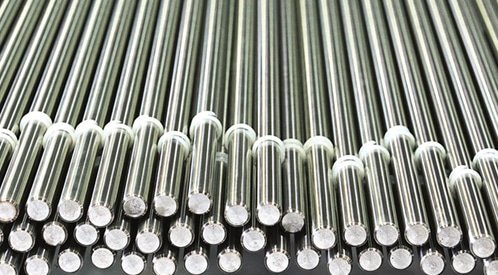
What is Round Bars?
The round bars are essentially long cylindrical bars that are somewhat thick and have a circular base. It is a metal product that has already been pre-finished and may be used for various purposes in industry and commerce. In terms of the round bar production process, which may be adjusted in any way, Stanleyalloys is both a manufacturer and a supplier of Stainless Steel Round Bars with a variety of strengths. These strengths can be hot or cold-rolled. Our goods are manufactured using cutting-edge engineering approaches and methods. They are dependable as well as risk-free to use. A round bar is a long cylindrical bar made of metal that has a variety of uses in both industrial and commercial settings. The shaft is by far the most typical implementation. The standard diameter ranges from one-quarter inch to twenty-four inches. There might be different sizes available. There are many different kinds of metal that can be rolled into round shapes, such as hot-rolled steel, cold-rolled steel, alloy steel, stainless steel, and so on.
Classification of Round Bars
Classification By Process
There are three distinct processes for producing round bar: hot rolling, forging, and cold drawing. 5.5-250 millimeters is the range of specification for the hot rolled round bar. Among them are: small round bar with a diameter between 5.5 and 25 millimetres, which is typically utilised as steel bars, bolts, and a variety of other mechanical parts; round bar with a diameter greater than 25 millimetres, which is primarily utilised for production of mechanical components, seamless steel tube billets, and other similar products.

Classification By Chemical Composition
According to its chemical makeup, carbon steel may be subdivided into three categories: low carbon steel, medium carbon steel, and high carbon steel
Mild
Low carbon steel, which has a carbon content ranging from 0.10% to 0.30% and is also called as mild steel, is readily adaptable to a wide variety of processing methods including forging, welding, and cutting. It is frequently employed in the production of chains, rivets, bolts, and shafts, among other things.
Medium Carbon Steel
Steel made of carbon has a carbon percentage of between 0.25% and 0.60%. Steel may be produced in a number of different forms, including killed steel, semi-killed steel, boiling steel, and other forms. In addition to carbon, it could also have a trace amount of manganese, ranging from 0.70% to 1.20% of its total mass. Carbon structure steel may be separated into two categories, depending on the quality of the product: ordinary carbon structural steel and high-grade carbon structural steel. While the performance of hot working and cutting is satisfactory, the performance of welding is unsatisfactory. The elasticity and roughness are lower than that of low carbon steel, despite the fact that the strength and hardness are greater than that of low carbon steel. Materials that have been hot rolled or cold drawn may be used immediately without first undergoing heat treatment, and they can also be utilised after having undergone heat treatment. The quench and tempering of the medium carbon steel results in the steel having excellent comprehensive mechanical characteristics. The greatest possible hardness is around HRC55 (hb538), while the range for B is between 600 and 1100 mpa. As a result of this, medium carbon steel is used extensively in a variety of different applications that need medium strength. In addition to its usage as a construction material, it is also put to extensive use in the production of a wide variety of different mechanical elements.
High Carbon Steel
Tool steel is a kind of steel that may be toughened and tempered and has a carbon content ranging from 0.60% to 1.70%. The steel used to make hammers and crowbars has a carbon concentration of 0.75 percent, whereas the steel used to make cutting tools like drills, taps, and reamers has a carbon level of 0.90 percent to 1 percent.

Classification By Material
Stainless Steel round Bars
Round bars made of stainless steel have an exceptional resistance to corrosion. The stainless steel is able to withstand high levels of acidity and is also suitable for use in situations that include chlorine or in solutions that are alkaline.
Aluminium round Bars
Aluminum round bars are characterised by their low density, high durability against corrosion, and ease of machining and cutting, among other desirable qualities. Supports, trim, bracing, pins, and dowels are a few of the common uses for aluminium round bar. Other applications include the shaft.
Brass round Bars
When the properties of strength, electrical conductivity, corrosion resistance, and flame reaction are prioritised, round bars made of brass are used. Brass is a soft metal that can be machined with relative ease and cleaned to a beautiful gloss. Applications of brass rods include maritime hardware, instruments, fasteners, and fittings, to name a few of these categories.

Features of Round Bars
High Tensile Strength: The round bars' tensile strength will vary from batch to batch due to the different grades of steel that are used in their production. Even if they are subjected to intense heat, the high-strength round bars will be able to keep their original quality. This is because of their superior resistance to deformation.
Malleable: The fact that the circular bars may be cut or pressed makes them suitable for use with a variety of different metal fittings and connections. Because of their malleability, round bars may be utilised to produce very small fasteners in addition to extremely large pieces of equipment.
Surface Finish: By polishing round bars, a variety of finishes may be produced, which not only improves their look but also contributes to their usefulness.
Different Shape: It is versatile and may be used for a variety of purposes due to the availability of circular bars in a variety of sizes. Round bars need very little maintenance, which is something that industries may profit from.
Anti - Corrosion: To sustain stability over a longer period of time, corrosion resistance must be enhanced. Additionally, it increases the resilience of the round bars to wear and strain.

Uses of Round Bars
Round bars are used by a variety of company kinds. The most common applications for round bars are frameworks, supports, railways, axles, and other related applications. The following is detailed information on the use of round bars.
Pump Shafts: Pump shafts are often manufactured from bars, which, depending on their use, may take on a number of shapes. Because they can survive the harsh circumstances to which pump shafts are subjected, stainless steel round bars are a suitable material.
Machines Equipment : The machining industry places a significant emphasis on the use of round bars. Stanley Alloys, the world's leading producer of round bars, is responsible for the production and supply of high-grade round bars. These bars may be designed into high-quality finished goods.
Valves :Due to the wide range of round bar sizes available, it is often utilised in the production of valves. These bars are utilised as plungers due to their high degree of hardness and exceptional resistance to wear.
Dairy Equipment : There is a significant need for dairy equipment. In the construction of milk tanks or silos, round bars are used extensively. Round bars provide increased product safety and are more durable than other bar shapes.
Medical Equipment : In a number of medical situations, round bars may be used for a variety of reasons. It is used in the manufacturing of orthodontic and dental apparatus. Round bars share traits of strength, durability, and dependability in performance.
Stanley alloys is a well-known manufacturer of stainless steel round bars, and the firm makes it a point to employ only certified steel of the highest possible quality in the manufacturing process. We provide customization based on technical specifications, and we guarantee the product's superior quality.
 "GOVERNMENT RECOGNISED STAR EXPORT HOUSE"
"GOVERNMENT RECOGNISED STAR EXPORT HOUSE"



 India
India Japan
Japan Russia
Russia United States
United States Saudi Arabia
Saudi Arabia Kuwait
Kuwait Singapore
Singapore Malaysia
Malaysia UAE
UAE Germany
Germany Italy
Italy China
China UK
UK Canada
Canada Iran
Iran Thailand
Thailand South Korea
South Korea Turkey
Turkey Morocco
Morocco Costa Rica
Costa Rica Kazakhstan
Kazakhstan Philippines
Philippines Egypt
Egypt Vietnam
Vietnam Oman
Oman Australia
Australia Qatar
Qatar Portugal
Portugal Mexico
Mexico Brazil
Brazil France
France South Africa
South Africa Jordan
Jordan Spain
Spain Hong Kong
Hong Kong Netherlands
Netherlands Indonesia
Indonesia Taiwan
Taiwan Nigeria
Nigeria Bangladesh
Bangladesh Iraq
Iraq Ukraine
Ukraine Poland
Poland Romania
Romania Cyprus
Cyprus Angola
Angola Colombia
Colombia Norway
Norway Chile
Chile Tobago
Tobago Greece
Greece Czechia
Czechia Belgium
Belgium Sri Lanka
Sri Lanka Myanmar
Myanmar Venezuela
Venezuela